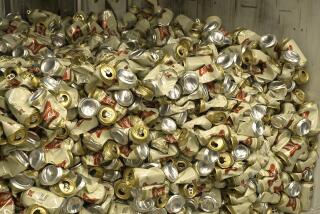Unfair Competition Seen : Canada Brewers Foam Over Low U.S. Prices
- Share via
TORONTO — Canadian brewers, worried that cheaper U.S. beer is grabbing a growing share of a stagnating market, have accused some U.S. rivals of dumping and are pushing officials to boost prices of the competing brands.
“They are dumping and selling in Canada at a price less than their home market,” said Howard Collins, a spokesman for the Brewers Assn. of Canada.
But the brewers are unwilling to lodge an official complaint with the Canadian government, even though they say hundreds of jobs are threatened.
Dealing With Liquor Boards
The big three--Molson Breweries of Canada Ltd., Carling O’Keefe Breweries of Canada Ltd. and Labatt Brewing Co Ltd.--prefer to work out a deal with the liquor boards that distribute beer in most provinces.
“We want them (the U.S. brewers) to pay more taxes or pay the full cost of distribution,” Collins said.
Industry analysts said dumping is a difficult case to prove legally, which is why the brewers are lobbying for higher markups and taxes.
In Ontario, the province where U.S. beer’s surge is rising fastest, sales jumped to $17.3 million ($14.5 million U.S. dollars) in February, 1989, from $3.2 million ($2.5 million) a year earlier, according to Liquor Control Board of Ontario figures.
U.S.-brewed beer’s share of the $2.5-billion ($2.1-billion) Canadian market rose to 2.6% in 1988 from 2.1% in 1987, according to the brewers’ group.
By comparison, Labatt has a market share of just over 40%, Molson has about one-third and Carling, which is owned by Elders IXL Ltd. of Australia, has around 20%. If Molson and Carling receive government approval for a merger proposal made earlier this year, the combined firm will probably lead the industry.
Analysts and industry officials say that even though the U.S. brewers have only a tiny market share in contrast with the Canadians, the sudden growth could prove a threat because the beer market is flat. Sales are not rising anymore, they said, because of consumers’ growing focus on health.
“It doesn’t pose much of a problem for the industry now, but these things have a habit of growing,” said Martin Kaufman, of Nesbitt Thomson Deacon Inc.
But U.S. beer producers, who also face growing health concerns, do not want to give up their share of the Canadian market. Officials at two of the firms singled out by the Canadian brewers--G. Heileman Brewing Co., which makes Lone Star, and Stroh Brewery Co., which manufactures Old Milwaukee--were quick to deny the dumping charges.
A statement by Simon Marshall, director of international sales and marketing for Stroh, called the dumping charges “completely without foundation” and said consumers were drinking Old Milwaukee because of its high quality and good value.
Old Milwaukee and Lone Star sell for about $4.50 ($3.65) for a six-pack in Ontario, which is $2 ($1.65) less than most Canadian-brewed beers. Those include U.S. brand-name beers made in Canada under contract. Molson makes Coors, Labatt manufactures Budweiser and Carling produces Miller.
Canadian brewers say they cannot produce beer as cheaply because they are not as large as the U.S. companies, who have greater economies of scale. Canadian provincial laws require production of beer in the province where it is sold.
Because of this, the politically powerful Canadian brewers were able to lobby successfully to have beer exempted from the free trade agreement between Canada and the United States, which took effect Jan. 1.
More to Read
Inside the business of entertainment
The Wide Shot brings you news, analysis and insights on everything from streaming wars to production — and what it all means for the future.
You may occasionally receive promotional content from the Los Angeles Times.









